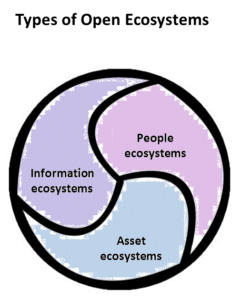 Brian Chesky and Joe Gebbia of Airbnb famously used their living room as a bed and breakfast to get their business idea off the ground (The air mattresses involved were apparently the “Airbed” in the name AirBed and Breakfast). Fast forward about 10 years and Airbnb has a higher market cap than Hilton or Marriott today, but with very few capital assets. Chesky and Gebbia simply tapped into unutilized assets (available rooms and properties), a trend that has gone beyond rooms, cars, yachts and jets to now include just about anything.
Brian Chesky and Joe Gebbia of Airbnb famously used their living room as a bed and breakfast to get their business idea off the ground (The air mattresses involved were apparently the “Airbed” in the name AirBed and Breakfast). Fast forward about 10 years and Airbnb has a higher market cap than Hilton or Marriott today, but with very few capital assets. Chesky and Gebbia simply tapped into unutilized assets (available rooms and properties), a trend that has gone beyond rooms, cars, yachts and jets to now include just about anything.
Shared assets are only one category of open ecosystems. Another is Crowdsourcing, which is simply a form of open ecosystem that involves sharing talent and ideas. A third type is Information ecosystems, which shares information assets across organization boundaries. Together, all three forms can dramatically multiply the effectiveness and leverage of your organization, in the same manner that Chesky and Gebbia did with their original idea.
Asset ecosystems – Really? Money for nothing?
Well, it may not be exactly money for nothing, but you certainly get by without owning capital assets. You’re familiar with Uber and Airbnb. But it is the sheer breadth of the type of assets that can be shared that is mind boggling. And if these assets can be leveraged across complete strangers, then there is little that prevents consortiums of trusted enterprises to leverage assets in smaller groups.
Here’s a small sample of companies that participate in the asset sharing economy, courtesy Jeremiah Owyang at the web-strategist blog.
BMW Drive NOW Premium Car Sharing by BMW i, Mini, and Sixt
Velib Parisian Bike Share
Solar City America’s leading full service Solar provider
Rent-a-toy Singapore toy rental
CampusBookRentals You Textbook Alternative
Art.sy Art Rental – Learn about and collect the worlds greatest art
Fashionhire Fashion Rental – Why Buy When You Can Hire
Quickflix Smart Movies
Getable General merchandise and equipment rental from your mobile phone
AnyHire Your hire and rental marketplace
Toolspinner Find tools in your area
Zilok Zilok Peer to Peer Renting – Rent anything, On-line! Rentals from Businesses and Individuals.
Neighborgoods Save money and resources by sharing stuff with your friends
Open Shed Why buy when you can share?
Neigh*borrow Things people need to use but don’t need to own
Roomorama Quality accomodations for the discerning traveler
Grubwithus Never eat alone on Grubwithus
Eatwithme Food. Photos. Writing.
Spaceout Your one-stop place for space
Sharemystorage Find a place to store
Parkatmyhouse Smarter Parking
3rd Space Studios 3rd Space Studios benefit from large spaces and studio members with a range of disciplines
Techshop Build your dreams here
Desksnearme Need a space to work?
Zopa Get a loan today
Ourgoods A barter network for the creative community
Tourboarding How to stay and play in China for Free
Kickstarter Fund and follow creativitiy
Urbangardenshare Urban Garden Share pairs together eager gardeners with eager gardens
Yardshare Front yard, side yard, & backyard landscaping ideas & garden design pictures shared by homeowners and landscape contractors.
Swapsity Canada’s #1 Swapping Community
Dogvacay Board your dog in a real home
People ecosystems – Can they realistically replace employees fully?
No, and to be honest that’s not the point. (Apologies for that blatant piece of misdirection). What people ecosystems do is open up a world of new assets on demand. In all likelihood this will complement, rather than replace employees. But that complementary piece is breakthrough.
Crowdsourcing of ideas is not a new phenomenon. In 1919 the Orteig prize of $25000 was offered to the first allied pilot who could fly non-stop from New York to Paris. Charles Lindbergh won that. What is new is the sheer scale, and the ease of tapping into it. Today, the world’s population can be your employee set, and the internet is the new Operating System to leverage them. Essentially any work that can be defined as a task or a set of tasks can be crowdsourced.
So can you crowdsource creative work? Yes – easily. Videos, artwork, campaign creatives, idea generation and so on…. How about technical work? Absolutely! Software testing, programming, transcription, analytics, technical R&D – all possible. How about business services? You bet. Financial, call centers, data management, order management, IT support, legal – these are fairly mainstream. But here’s the kicker – you can crowdsource even highly restricted activities by breaking them into small tasks. Or have pre-screened, secure resources working on your confidential problems. If you can crowdsource cyber security testing, you know that nothing is impossible here!
Information ecosystems – Put your idle information to work
Information assets that can be put to better use via the sharing economy are similar to sharing spare physical assets. When enough people combine their narrow piece of information with that of many others using a “Platform”, you can get a breakthrough product. Think Wikipedia. Information ecosystems are what you get when people share data on Platforms.
The rise of connected digital technology has made it possible to create such Platforms. Most Cloud services (e.g. Gmail) are simply platforms for sharing information. Facebook is an “experience” platform that allows multiple people to share experiences in a meaningful way. eBay is a “marketplace” platform.
So how does this help you in an enterprise? Connecting data or systems that are typically siloed in an organization can dramatically increase efficiency. Using an open ecosystem that allows thousands of companies to share transitional information among situationally relevant, secure, selected partners (e.g. data such as sales order, purchase order, payments, receivables, vendor master data, etc) can dramatically ease the transactional pain of doing business. If you think about it, this is no different than what Linked-in has done for professional contacts and relationships.
Where to start?
Just get started! Open ecosystems can be leveraged for work processes in the enterprise just as much as they can be used for your personal services. Your digital strategy needs to leverage the tremendous availability of talent, information flow and assets made possible in today’s connected economy. Leveraging open ecosystems needs to be an integral part of your Business Strategy, brought to life via your digital strategy.
What do you think? Agree? Disagree?

